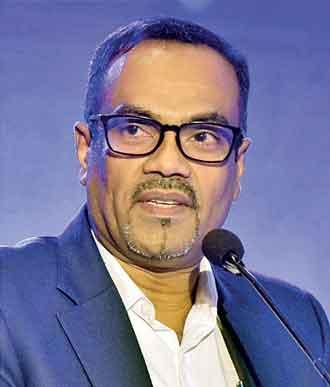
Fresh focus on bridging financial, real economy divides: Govt.
- Prof. Anil Jayantha Fernando stresses need for a vibrant capital market in the future.
- Says will try to create a conducive and democratic environment for investments.
- Points out 2025 will be a challenging year.
The government announced its plans to strengthen the connection between financial markets, including capital markets, and the real economy, while integrating advancements in emerging technologies.
This comes as limited fiscal capacity constrains its ability to fully invest in development initiatives.
Minister of Labor, Prof. Anil Jayantha Fernando, while delivering the keynote at the Colombo Investor Symposium 2025 by First Capital Holdings in Colombo last Friday, outlined that the financial sector must have a strong linkage to the real economy. Failing which, he warned that an alienated financial sector could ultimately crash.
“There will be an issue when the financial sphere is not connected to the real economy, not driven by fundamentals. We need to bring about vibrant capital markets in the future. Alienated financial sphere can grow up to a limit, after that it will crash. Technology sphere also must merge with this,” he stressed.
He noted that the political and economic sphere had become detached over the period and this detachment led to many issues in the economy at the present.
“When it comes to politics in the past, basically, the political sphere and economic sphere were really converged, driven by one authority who had the political power. Gradually, what happened was there was a detachment. The political sphere was detached from the economic sphere,” he added.
He emphasized that capital markets could play a vital role in driving sustainable and equitable economic growth amidst current tight and limited fiscal capabilities.
“Our vision is to converge these spheres, channel finance into the real economy. Capital formation is going to play a critical role, capital formation will help to channel savings into investments. We will try to create a conducive and democratic environment for investments, thereby we mainly focus on a very strong regulatory framework and increasing efficiency of operations, plan to play a facilitator role,” he elaborated.
According to him, under the current IMF programme, the government can only go up to Rs.4280 billion in recurrent expenditure this year while there’s some space to maneuver in capital expenditure with a floor limit set at Rs.1320 billion.
“When it comes to capital expense, some space is there. We have repurposed some expenses. We manage to incorporate items highlighted in our election manifesto,” he said.
Therefore, other financial avenues remain critical to achieve economic and development objectives this year.
“It’s a challenging year. Depending on the success we achieved in 2025, we will get into a comfortable position in coming years,” he said.
According to First Capital Research (FCR), 2025 is geared to present a dynamic market landscape shaped by rising yields, strong equity market performance, and evolving credit conditions.
“A balanced, strategic approach such as the following is encouraged. Prioritize short-tenor G-Sec investments to navigate yield volatility. Monitor lending rate trends to assess borrowing costs and investment returns. Leverage equity market growth but remain vigilant about profit-taking opportunities to secure gains and diversify portfolios.
This well-rounded strategy aims to help investors optimize returns while effectively managing risks amid shifting market dynamics,” FCR said.
Prof. Fernando reiterated the government’s commitment to create a conducive and democratic environment for investments.
“So thereby, we are mainly focusing on a very strong regulatory framework and increasing efficiency of operations, we plan to play a facilitator role,” he added.